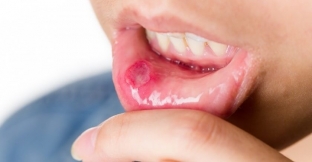Allergic stomatitis cannot be considered an independent disease, since most often it is only one of the symptom complexes that occur with allergic reactions. Based on this, allergic stomatitis can be characterized as an inflammatory process of the oral mucosa and tongue, which occurs in response to the ingestion of a specific agent called an allergen. Most often, the cause of this type of stomatitis is allergens that enter the body with food and primarily come into contact with the oral mucosa.
Clinical manifestations and forms of allergic stomatitis
Allergic stomatitis can be provoked by a variety of foods and nutritional supplements. In addition, allergic stomatitis often occurs in response to foreign material entering the mouth. First of all, we are talking about piercings and dentures, the material of which can also stimulate an allergic response.
According to its clinical course, allergic stomatitis is divided into three forms, each of which has specific manifestations.
Forms of allergic stomatitis:
- The catarrhal form of the allergic process proceeds with the patient's characteristic complaints of dry mouth, taste disorder, discomfort and pain during eating, constant itching and burning against the background of simple redness of the mucous membrane.
- Erosive-ulcerative form of stomatitis is manifested by characteristic rashes in the form of painful blisters. As a rule, after a few days, these same bubbles burst, and painful erosions form in their place.

With this form of stomatitis, body temperature may increase, regional lymph nodes may increase, and soft tissue edema may occur in the perioral area.
- Ulcerative-necrotic form of allergic stomatitis is the most severe manifestation of this disease. Against the background of severe general weakness, fever and severe headache, the patient develops deep ulcerative lesions of the oral mucosa, which later become covered with a black scab.
Principles of treatment and prevention of allergic stomatitis
As with any other allergic process, the first step in the treatment of stomatitis is to eliminate the provoking factor. If a person initially knows the cause of his illness, then he must consciously control those foods that can provoke an allergy, estet-portal.com emphasizes. At the first episode of an allergic reaction of this type, it is necessary to try to analyze the diet that has been observed over the past few days. If there are any specific agents that can cause allergy among the foods that have been consumed during this time, should be avoided in the future.
If there are removable dentures or piercings in the mouth, all foreign material must be removed if allergic stomatitis develops.
The described procedures help prevent the occurrence of allergic stomatitis. If this was not possible, then you need to use those medicines that will help reduce the symptoms. As a rule, these are any antihistamines. If the latter are ineffective, patients may be prescribed glucocorticosteroids.
Painkillers, anti-inflammatory and antipyretic drugs may be recommended to the patient. If available erosions or ulcers on the mucous membranes of the oral cavity, it is necessary to use rinses with antiseptic solutions. This will help prevent infection in allergic stomatitis and the occurrence of purulent inflammation.







Add a comment